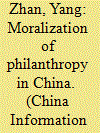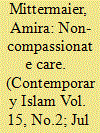| Srl | Item |
| 1 |
ID:
173794


|
|
|
|
|
| Summary/Abstract |
Neo-liberalism shifts social responsibility to individuals. The practice of neo-liberal governmentality in China confirms this worldwide trend. This is evident when government retreats from the responsibilities of providing social welfare for rural migrant workers and leaves them to privately funded philanthropy programmes. However, the Chinese case also presents an anomaly in that the shifting of responsibilities under neo-liberalism results not only in individualization, but also in mutual obligations created by moralization. This article explores philanthropy programmes in migrant settlements in contemporary Beijing within a larger neo-liberal context. It provides an ethnographic account of the moralization process informed by the culturally specific notion of aixin (爱心), or loving heart. I argue that moralization within philanthropy programmes is crucial in reconfiguring the modes of responsibility in post-socialist China. Here, social obligations and consolidation of old hierarchies and social inequalities go hand in hand with social individualization.
|
|
|
|
|
|
|
|
|
|
|
|
|
|
|
|
| 2 |
ID:
179998


|
|
|
|
|
| Summary/Abstract |
Drawing on fieldwork at a large charity organization in Cairo, this article describes a bureaucratized Islamic ethics of care. Founded in 1975, the Mustafa Mahmoud Association today offers free and discounted medical services, funds micro-projects, and provides financial support to about 10,000 families each year. The bulk of that financial support comes from donors’ private donations in the form of obligatory and voluntary alms (zakāt and sadaqa). By taking a close look at three offices—the donation, intake, and disbursement office—I untangle the regime of care that shapes the daily transactions at this Islamic charity organization. In particular I highlight a significant gap between “caring for” and “caring about.” Donors view caring for those in need as a duty and frequently frame their donations in calculative terms, as a way of “trading with God.” Less central is a language of empathy or compassion. While this seemingly careless care-less? Careless means not careful, sloppy. form of caremight seem cold and heartless, I suggest that it offers a powerful alternative to the liberal illusion of “compassion.”
|
|
|
|
|
|
|
|
|
|
|
|
|
|
|
|